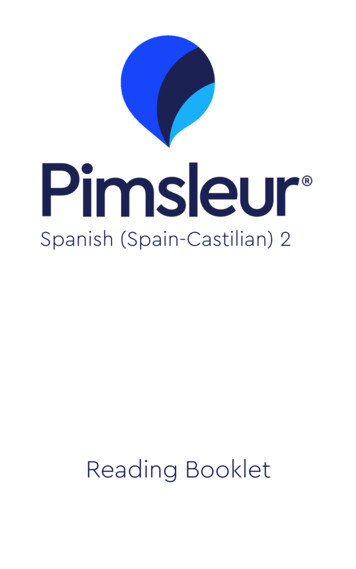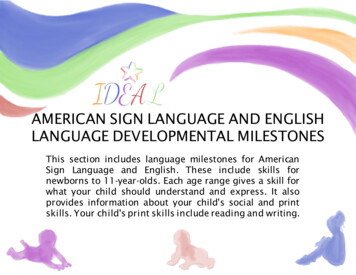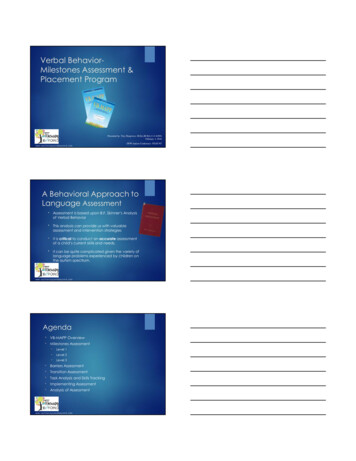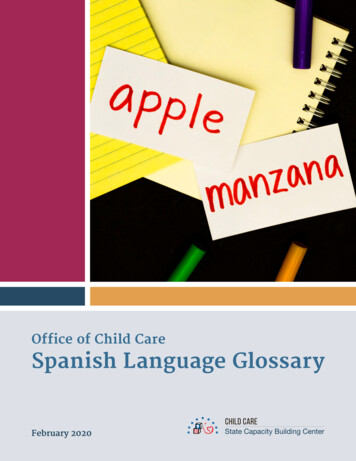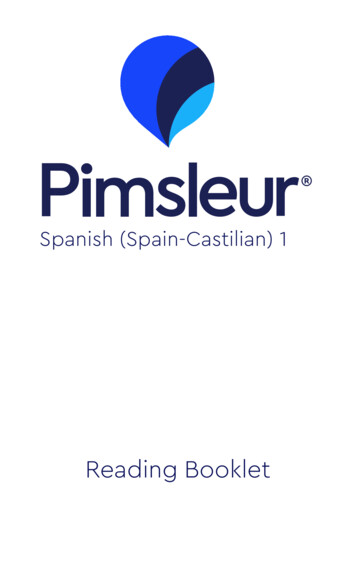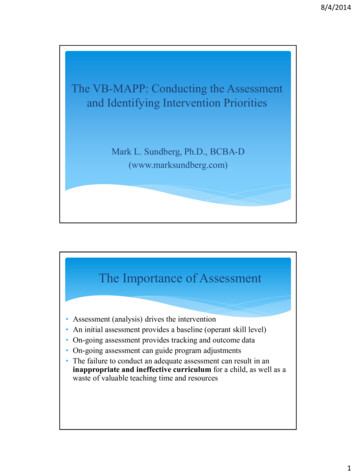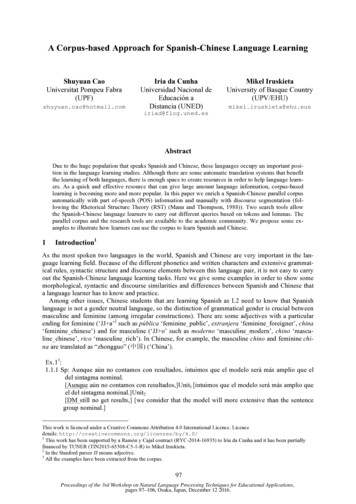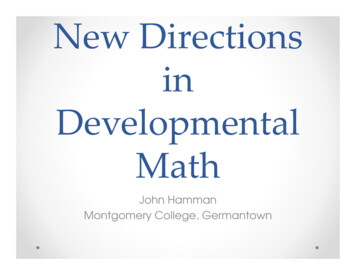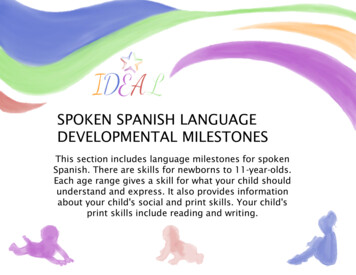
Transcription
SPOKEN SPANISH LANGUAGEDEVELOPMENTAL MILESTONESThis section includes language milestones for spokenSpanish. There are skills for newborns to 11-year-olds.Each age range gives a skill for what your child shouldunderstand and express. It also provides informationabout your child's social and print skills. Your child'sprint skills include reading and writing.
Table of ContentsIntroductionSM-33-4 yrs. social and print skillsSM-190-3 mos. receptive and expressive language skillsSM-44-5 yrs. receptive and expressive language skillsSM-200-3 months social and print skillsSM-54-5 years social and print skillsSM-213-6 mos. receptive and expressive language skillsSM-65-6 yrs. receptive and expressive language skillsSM-223-6 months social and print skillsSM-75-6 years social and print skillsSM-236-9 mos. receptive and expressive language skillsSM-86-7 yrs. receptive and expressive language skillsSM-246-9 months social and print skillsSM-96-7 years social and print skillsSM-259-12 mos. receptive and expressive language skillsSM-107-8 yrs. receptive and expressive language skillsSM-269-12 months social and print skillsSM-117-8 years social and print skillsSM-2712-18 mos. receptive and expressive language skillsSM-128-9 yrs. receptive and expressive language skillsSM-2812-18 months social and print skillsSM-138-9 years social and print skillsSM-2918-24 mos. receptive and expressive language skillsSM-149- 10 yrs. receptive and expressive language skillsSM-3018-24 months social and print skillsSM-159-10 years social and print skillsSM-312-3 yrs. receptive and expressive languageSM-1610-11 yrs. receptive and expressive language skillsSM-322-3 yrs. social and print skillsSM-1710-11 years social and print skillsSM-333-4 yrs. receptive and expressive languageSM-18ReferencesSM-34
Developmental milestones are the behaviors or skills seen in infants and children as they grow,learn, and change. There is a typical range in which a child will reach a milestone. Milestones onmost checklists are not when an average child has mastered a skill. It is when 80-90% of thechildren within that age range have mastered the listed skill. Keeping track of milestones can helpidentify when your child may need some support (e.g., language therapy). The sooner your childreceives any needed supports, the better their outcomes will be.This resource includes milestones forspoken Spanish from Standard LatinAmerican Spanish. It does not addresspossible grammar or cultural differencesthat are present because of dialects orregional variances. Dialects are rule-basedvariations of Spanish. Your child shouldspeak like their community. Thiscommunity will include family,neighborhood friends, and school friends.Additionally, this resource is addressing development ofchildren that have auditory access to and only usespoken Spanish. If your child is developing anotherlanguage at the same time as their spoken Spanish,such as American Sign Language or spoken English,there may slight differences for some skills. Please seethe General Language section of this parent handout tolearn what language skills develop regardless of thelanguage(s) of your child.As your child’s first teacher, you have an amazing opportunity to nurture yourchild’s language growth. By taking an active role, parents can help ensure thattheir child has all the support they need to develop to their full potential.SM-3
Birth to 3 months Receptive and Expressive Language SkillsLanguage your child understandsBirth to 3monthsHow your child expressesthoughts/feelingsYour child will startle to loud noises.Your child will cry in different waysdepending on their different needs.Your child will be silent or smile when youspeak to them.Your child will smile at others.Your child will seem to recognize your voiceand will calm down if they are crying.Your child will respond to your face and lookattentively at your face (by 3 months).Your child will sometimes vocalize inresponse to sounds.Your child will make cooing or chirpingsounds.Your child will react differently to voices,sounds, and emotions.Your baby is listening/viewing andlearning all the time. This helps your babyunderstand their world. Children who aredeaf and hard of hearing are the same ashearing babies. They can also learnseveral languages if they have access tothe language.SM-4
Birth – 3 months Social and Print SkillsYour Child’s Social SkillsYour Child’s Print SkillsYour child will look at your face and localize you withtheir eyes (by 3 months).Your child will begin to imitate facial movements.Your child will start smiling at people.Your child will calm down without help for briefmoments (puts fingers in mouth and sucks on hand).Your child will try to look at their parents.Early exposure tobooks is important!Try using the timeyour child is playingon their stomach toread simple boardbooks to your child.You have begun the exciting journey of watching yourchild grow, learn, and change! We hope you cherishthe time you have to focus on loving and bonding withyour baby who is deaf or hard of hearing. SM-5
3-6 months Receptive and Expressive Language SkillsLanguage your child understands3-6 monthsHow your child expressesthoughts/feelingsYour child will respond to changes in tone ofvoice.Your child will chirp and babble when playingalone with you.Your child will respond to sounds byproducing sounds.Your child will babble using speech-likesounds such as pa, ba, and mi.Your child will move their eyes in thedirection of sounds.Your child will use non-verbal means to callattention to physical needs (e.g., toileting,hunger).Your child will sometimes respond to theirown name.Your child will try to imitate sounds.Your child will often stop crying in responseto voice.Your child will use non-verbal means toexpress personal reactions (e.g., curiosity,surprise, reluctance).Your child will pay attention to music.Your child will cry in different ways to showthey are hungry, tired, or in pain.Your child will vocalize when you talk tothem.“Babies who are identified as deaf or hard of hearing (dhh) readilyaccept what they can hear or cannot hear as their normal experience.Their needs are simply to feel comfortable, be fed, and to be loved.” –Minnesota Hands and Voices Blog July 17, 2018SM-6
3-6 months Social and Print SkillsYour Child’s Social SkillsYour Child’s Print SkillsYour child will like to play with people and may even cry whena game is over.Your child will begin to enjoy finger-plays/finger games.Your child will imitate facial expressions.Your child will have joint attention (e.g., look at an object withyou).Your child will maintain eye contact.Your child will recognize familiar faces and begin to tell ifsomeone is a stranger.Your child will like to look at themselves.Your child will respond to others’ emotions and seem happy.Sign/Talk to your babythroughout the day. Tellthem about your plans,show them something in astore window, and askthem questions. Your babywill learn and later respondto you.If your child hasaccess, you can use yourhome language.SM-7
6-9 months Receptive and Expressive Language SkillsLanguage your child understands6 – 9 monthsHow your child expressesthoughts/feelingsYour child will turn and look in the directionof sounds.Your child will show objects by holding,pointing, reaching, or looking at them.Your child will turn and look at you when youcall their name.Your child will use sounds and gestures toattract and hold attention.Your child will look at a toy when you show itto them by pointing or holding it up.Your child will repeat consonant – vowelsyllables.Your child will recognize familiar objectswhen named.Your child will appear to sing.Your child will look attentively at a person’sface.Your child will use language to note thedisappearance of objects.Your child will begin to show attention tostory telling/ story signing.Your child will show they are excited orupset.Your child will listen when you say no.Children who are deaf or hard ofhearing can be expected to make thesame progress as their hearing peers ifthey have access to language.SM-8
6-9 months Social and Print SkillsYour Child’s Social SkillsYour Child’s Print SkillsYour child will have toy preferences.Your child will put books in their mouth.Your child will use gesture and/or voice to initiate contact.Your child will attend to/vocalize and pat pictures inbooks.Your child will understand communication turn-taking.Your child will begin to share a book with an adult.Your child will respond to social games (e.g., finger games,pat-a-cake).Your child will reach for a book.Your child will show a desire to interact with people(e.g., call out or wave to get attention).SM-9
9-12 months Receptive and Expressive Language SkillsLanguage your child understands9–12 monthsHow your child expressesthoughts/feelingsYour child will recognize the names ofobjects and familiar people e.g., cup, truck,juice, and papa).Your child will point to objects and showsthem to others.Your child begins to respond to simplequestions and phrases such as no, comehere, and do you want more?Your child will imitate various sounds ofspeech.Your child pays attention to songs and stories Your child will say one or two words aroundfor a short time.the first year like mama, papa, no, or bye-byethough all the words may not be clear.Your child will sometimes give toys/objectsYour child will greet others.on request.Your child will play games like cuckoo andbuttermilk with you.Your child will imitate inflections and rhythmswhen voicing.Your child will understand about 50 words.Your child will use gestures to say goodbye,ask to be carried, and say no.You can use toys, pictures, oractions to help your childthat is deaf or hard ofhearing understandlanguage.SM-10
9 – 12 months Social and Print SkillsYour Child’s Social SkillsYour child will complete activities with at least two turns.Plays ‘where’s baby?’ (cucú, peek-a-boo) and pat the hands.Your child will imitate the movements of others (e.g., nod,wave, and clap).Your Child’s Print SkillsYour child will attend to repetition of familiar signs and/orwords, songs, and rhymes.Your child will use a crayon to make marks on a paper.Your child will show interest in a familiar story or book.Your child will direct others by tugging and pushing.Your child will enjoy storytelling /storysigning.Introduce pretend play withyour child’s favorite doll ortoy animal. Include it in yourconversations and your play.For example, “Fluffy wants toplay, too. Can she roll theball with us?”SM-11
12- 18 months Receptive and Expressive Language SkillsLanguage your child understands12-18monthsHow your child expressesthoughts/feelingsYour child will follow simple commands.Your child will engage n symbolic play.Your child will respond to questions withgestures/pointing.Your child will use 20-50 words by 18months.Your child will find familiar objects out ofsight.Your child will imitate words.Your child will identify objects and actions inpictures.Your child will begin replacing gestures withthe use of words or word-like sounds.Your child will begin to answer what andwhere questions.Your child will say no and shakes their headin denial.Your child will search for objects namedverbally that are not in the room.Your child will verbally request and protest.Your child will imitate verbal turns.Your child will point to something to showsomeone what they want.Children who are deaf and hard of hearing benefit from visualcues to help them understand and access language. Be sureyou face your child when speaking, stoop down to their level,and have lighting that allows them to see your face.SM-11
12-18 months Years Social and Print SkillsYour Child’s Social SkillsYour Child’s Print SkillsReadingWritingYour child will like to give things to others asa game.Your child will carry a book.Your child will make up simple games withimagination (e.g., makes animal sounds withstuffed animals).Your child will hold a book withhelp and attempt to turn pages,usually several at a time.Your child will imitate other children.Your child will turn the book rightside-up.Your child will repeat what was justsaid/signed.Your child will point to a picture in abook when asked "Where's the?"Your child will scribble with acrayon or pencil.Your child will imitate actions of others.Your child will take turns as languagedevelops.Your child will begin to use signs/words torequest a turn (MY-TURN, “mine”).Build on what your child says. Ifthey say/sign “ball,” you can say,“That’s your big, red ball” orsign, BALL (big) RED, YOUR.SM-12
18-24 months Receptive and Expressive Language SkillsLanguage your child understands18-24monthsHow your child expressesthoughts/feelingsYour child will follow simple directions (e.g.,throw the ball or give the baby a kiss).Your child will begin to name the pictures inbooks.Your child will understand simple questions(e.g., Who is this? and Where is the shoe?)Your child will ask what, who and where (e.g.,"What (is) that?" "Who is it?" and "Where meow(kitty)?“)Your child will point to book illustrationswhen named.Your child will combine two words like morebread, baby up, and mama book,.Your child will complete two requests withone object.Your child will engage in word and soundplay.Your child will choose tow familiar objects onrequest.Your child will attempt to tell stories aboutexperiences.Your child will understand 250-500 words by24 months.Your child will use 200-300 words by 24months.Your child will follow 2-step relatedcommands on request by 24 months.Children who are deaf or hard of hearing learn the same ashearing children; by interacting with the world around them.They do so by interacting with a variety of people and objectsand having many experiences. Little things such as cleaning,cooking, fixing things, etc. all help your child learn, so besure to include your child when you do those tasks.SM-14
18-24 months Social and Print SkillsYour Child’s Social SkillsYour child will take 1-2 turns in aconversationYour child will use language to request helpYour Child’s Print SkillsReadingWritingYour child will attend to picturesand written text for severalminutesYour child will tell the differencebetween words and picturesYour child will initiate pretend playYour child will bring a book toan adult to readYour child will tell about past events andfuture actionsYour child will look at a bookalone and pretend to readfamiliar booksYour child will explore drawing,painting, and writing as a way tocommunicateYour child will imitate drawing marksor scribblingYour child will request information (e.g., Whatis this?)Your child will play mainly alongside otherchildren, although begins to include them ingames like running and chasing each otherSM-15
2-3 years Receptive and Expressive Language SkillsLanguage your child understandsYour child will understand opposite words,such as open-close, big-small, and up-down.2-3 yearsHow your child expressesthoughts/feelingsYour child will talk about things that are notin the same room.Your child will respond to yes/ no questions.Your child will use the present progressiveform (Los niños están comiendo).Your child will answer what who where andwhat are you doing questions.Your child will give commands with twosteps.Your child will understand connectedlanguage.You can say their name, age and gender.Your child will follow compound directions,such as "Find the spoon and put it on thetable."Your child will ask why?Your child will use approximately 1000 wordsby 3 years.Your child will use definite (el, la, los and las)and indefinite articles (un, una, unos andunas).Your child will use regular past tense/simplepreterit (Ella caminó por el parque.)Your child will combine three words to ask forthings and talk about them.Your child will say ]words like "I", "my", "we","you" and some plurals (cars, dogs, cats).Respecting children’s attempts atautonomy and independence is importantfor their social and emotional growth.SM-16
2-3 years Social and Print SkillsYour Child’s Social SkillsYour Child’s Print SkillsReadingWritingYour child will hold books with twohands and turn the pages one by one.Your child will tell a story foran adult to write.Your child will engage in make-believeactivities.Your child will recognize and identifysome letters in context.Your child will imitate simplelines and shapes with acrayon.Your child will express feelings (e.g., mad,happy, sad, scared).Your child will recognize that symbolshave meaning (e.g., the golden archessymbolizes McDonald’s).Your child will begin to give directions (e.g.,You do it, Don't touch it).Your child will recognize familiar booksby their cover.Your child will use questions to getinformation and request clarification.Your child will recite parts of well-knownstories, songs, and nursery rhymes.Your child will take turns, share, and askpermission of others.Your child will use language more in play(e.g., pretend to chat on thephone/text/videophone).Your child will tell a story from pictures.Your child will wait patiently for their turnwhile playing games with others.Your child will recite parts of well-knownstories and songs.Your child will share toys and join games.Your child will answer simple questionsabout a story.Ask your child totell you the storythat goes with afavorite book.“Tell me aboutthe mouse andthe cookie.”Reading helpslanguagedevelopment.SM-17
3-4 years Receptive and Expressive Language SkillsHow your child expressesthoughts/feelingsLanguage your child understands3-4 yearsYour child will respond when called fromanother room.Your child will use possessives (nuestro perro).Your child will carry out 3 relatedcommands in order.Your child will use irregular imperfect andpreterit past tense (La niña tenía 4 años; Saracorrió a su casa).Your child will understand 1,500-2,000words.Your child will engage in episodic play.Your child will name an object when giventhe function.Your child will understand the words forfamily members, such as brother,grandmother, and aunt.Your child will produce speech that isunderstood by all.Your child will begin to describe the use ofobjects.Your child will share personal experiences andshort personal narratives.Your child will combine 5 words to create asentence.Your child will use 800-1500 words.In play children learn how to learn. Encouragingcreative and imaginative play will build language andlearning skills.SM-18
3-4 years Social and Print SkillsYour Child’s Social SkillsYour Child’s Print SkillsReadingWritingYour child will take 4-5 turns duringconversation.Your child will understand thatbooks are made up of writtenwords.Your child will draw or copy twolines that cross ( ).Your child will relay a message.Your child will interact with booksread aloud to a group.Your child will print a few letters ornumbers.Your child will show understanding of others'feelings and needs and talk about what youlike.Your child will hold books rightside-up and turn pages left toright.Your child will draw pictures you canrecognize.Your child will make conversational repairs.Your child will answer questionsabout a story.Your child will draw pictures ofpeople that have at least three parts(e.g., head, eyes, nose, arms, legs).Your child will enjoy role-playing with others(e.g., play Mom and Dad).Your child will retell familiarstories.Your child will ask or respond to questions for Your child will identify someclarification.uppercase and lower-case letters.Your child will work in a small group for 1015 minutes.Your child will attend to a 10–15minute story.Your child will prefer to play with otherchildren more than alone.Your child will answer somequestions about a story.Join yourchild’spretend playgames.SM-19
4-5 years Receptive and Expressive Language SkillsLanguage your child understands4-5 yearsHow your child expressesthoughts/feelingsYour child will understand the words for theorder of events, such as first, after, and last.Your child will answer the question "What didyou say?“Your child will understand 13,000 words.Your child will tell a simple story thatincludes a beginning middle and end usingcomplete sentences related to a topic.Understand the words for chronologicalorder, such as yesterday, today, andtomorrow.Your child will use sentences with more thanone verb, such as jump, play, and search.Follow more complicated directions, like "Puton your pajamas, brush your teeth, and thenpick a book.“Your child will use 5–8-word sentences.Follow classroom directions, such as "On thispage, draw a circle around something thatcan be eaten.“Your child will use the same grammar asfamily/home environment.Understands most of what is spoken at homeand at school.Uses adjectives and descriptors in sentences.Your child will show the ability to think aboutand comment on language.Your child will use 2,500 words.Your child will say their full name andaddress.Closed captions are helpful to children whoare deaf and hard of hearing even if yourchild does not read yet. Be sure captions orSpanish subtitles are on all the time athome and school.SM-20
4-5 years Social and Print SkillsYour Child’s Social SkillsYour Child’s Print SkillsReadingWritingYour child will join conversations. They willchange the topic, nicely interrupt, and takeat least 4 turns.Your child will identify mostuppercase and some lowercaseletters.Your child will recognize their ownname in print.Your child will discuss make-believe thingsand places.With adult support, your child willtrack words in a book from left toright, top to bottom, and page topage.Your child will print their first name orat least four letters.Your child will understand humor andother points of view.Your child will retell familiar storieswith structure and varying verbtense.Your child will state their town, their birthmonth, and their parents’ first names.Your child will draw pictures of peoplethat have at least a head with eyesnose-mouth, body, arms and legs,hands and feet.Your child will draw and print in aplanned and organized way.Your child will use words to invite others toplay.Sign/talk “out loud” when you playwith your child. Ask open-endedquestions like “What do you thinkwill happen if ?”SM-21
5-6 years Receptive and Expressive Language SkillsLanguage your child understands5-6 yearsHow your child expressesthoughts/feelingsYour child will understand time sequences(e.g., what happened first, second).Your child will produce sounds /r, g, d, ɲ, tʃ//correctly all of the time.Your child will classify items by material (e.g.,cloth, glass).Your child will relate action and describingwords to their opposites.Your child will understand who, what, when,where, why, and how questions.Your child will give and restate simple 1, 2,and 3-step directions.Your child will understand verbs bydemonstrating the actions.Your child will describe familiar people,places, things, and events with details.Your child will follow group instruction anddiscussion.Your child will answer questions to get help,give information, or better explainsomething.Your child will add drawings or other visualsto descriptions to show ideas and feelings.Your child will use adult-like grammar whenthey talk.80-90% of things we know are learned incidentally. Hearingstudents constantly absorb new information and knowledgethrough the daily noises, conversations and language that isspoken around them. Deaf and hard-of-hearing students maymiss this information if it is not directly taught and/or theydo not have access.SM-22
5-6 years Social and Print SkillsYour Child’s Social SkillsYour child will ask questions to understand atopic.Your Child’s Print SkillsReadingWritingYour child will engage in a group Your child will print all letters of thereading with purpose andalphabet by copying them or fromunderstanding.memory.Your child will follow agreed-upon rules fordiscussions (e.g., attend to others, takingturns).Your child will identify and nameall uppercase (capital) andlowercase letters of thealphabet.Your child will write most uppercaseand lowercase letters with correctspacing.Your child will engage in different kinds ofconversations.Your child will understand thatprint goes from left to right andtop to bottom.Your child will use words and picturesto tell an event or simple story in theright order.Your child will maintain a conversation andrespond to comments.Your child will print first and lastname with letters facing in the correctdirection.Your child will tell a well-structured, personalstory.Cook with your child.Cooking gives you timetogether. You can work onfollowing directions,math skills, and vocabulary.SM-23
6-7 years Receptive and Expressive Language SkillsLanguage your child understands6-7 yearsHow your child expressesthoughts/feelingsYour child will be able to summarize a storyafter one exposure.Your child will produce sounds /x, s/correctly all of the time.Your child will distinguish initial, middle andfinal sounds in single syllable words.Your child will produce narratives havecentral point, climax, and resolution.Your child will be able to identify things thatdon’t make sense in a sentence, both in themeaning of words and in the grammar.Your child tells and retells stories in logicalorder using complete sentences.Your child will produce full explanations.Your child will give and restate multi-stepdirections.Having good language skills is essential in order todeveloping good reading skills. If your child has delayedreading, they may have some struggles with language.SM-24
7-8 years Social and Print SkillsYour Child’s Print SkillsReadingWritingYour Child’s Social SkillsYour child will nicely gain attention andattend to others.By the end of first grade, Your childwill read most Spanish text with ahigh level of accuracy, regardless ofthe familiarity of the word patterns.Your child will print letters well.Your child will have discussions with differentpeople.Your child will be concerned withhow their writing looks.Your child will tell jokes.Your child will learn to spell oneand two-syllable words.Your child will check on a listener’sunderstanding.Your child will respond nicely to praise andapologies.Your child will establish handdominance and pencil grip.Your child will add words andsimple sentences to pictures towrite a story.Sign/talk to your child aboutthings you remember from whenyou were a child. Teach themyour favorite game from whenyou were a child and play itregularly.SM-25
7-8 years Receptive and Expressive Language SkillsLanguage your child understands7-8 yearsHow your child expressesthoughts/feelingsYour child will understand that words havesynonyms and multiple meanings.Your child will consistently produce thetrilled r.Your child use context clues to learn themeaning of unknown words.Your child will use more complex sentencestructures.Your child will follow 3-4 oral directions inorder.Your child can clarify ideas when notunderstood.Your child will answer questions about astory.Your child will produce narratives that havecomplete episodes, including a setting,reaction of characters, conflict, and aresolution.Your child will understand words about placeand time.Your child will form their own ideas andopinions.Only 30-40% of spoken language is visible on the lips forchildren who are deaf and hard of hearing to gaininformation. Your child will need full access to language tocontinue to grow, learn, and change.SM-26
6-7 years Social and Print SkillsYour Child’s Social SkillsYour child will produce full explanations.Your child will give multistep directions.Your child will check for comprehension.Your Child’s Print SkillsReadingWritingYour child will connect what theyYour child will summarize stories withread to personal experiences andone to two short sentences.world events.Your child will write simple stories withYour child will read grade-levelshort sentences in sequence withmaterial and understand the text.pictures.Your child will go back and reread a sentence that does notmake sense (self-monitor).Your child will write short journalentries.Your child will respond well to compliments.Think about usingwordless books and allowyour child to tell you astory independently.SM-27
8-9 years Receptive and Expressive Language SkillsLanguage your child understands8-9 yearsHow your child expressesthoughts/feelingsYour child will understand what is taught inclass.Your child will share their own ideas andopinions.Your child will retell, paraphrase, and explainthe main ideas and supporting details of alesson.Your child will explain classroom vocabulary.Your child will follow 4-step and higherdirections.Your child will ask complex questions to gaininformation.Your child will use words taught in subjectslike science, math, and social studies.Your child will ask and answer questionsabout information from a speaker.Your child will ask and answer factual andinferential questions.It is very difficult for a student who is deaf or hardof hearing to take notes and keep the watching thespeaker/interpreter to get visual information. Theybenefit greatly from a note taker.SM-28
8-9 years Social and Print SkillsYour Child’s Social SkillsYour child will bring books and assignmentsfrom school to home and return them toschool.Your child will use language to attain andmaintain social status.Your Child’s Print SkillsReadingWritingYour child will begin to move from"learning to read" to "reading tolearn" (by third grade).Your child will be able to identifythe setting, characters, theme, andplot of a story.Your child will understand others' viewpoints.Your child will describe charactersin a story and explain how theiractions impact the plot.Your child will give background details.Your child will retell folklore, fables,and tall tales.Your child will begin revising theirwork.Your child will use writing to relateexperiences.Your child will perform chores that take 15-20Your child will determine the mainminutes and run errands that involve timeidea of a text and recount keydelays
spoken Spanish. If your child is developing another language at the same time as their spoken Spanish, such as American Sign Language or spoken English, there may slight differences for some skills. Please see the General Language section of this parent handout to learn what language skills develop rega
